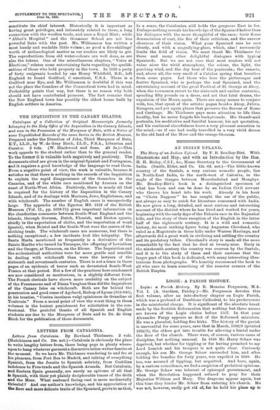Letters from Catalonia. By Rowland Thirlmere. 2 vols. (Hutchinson and
Co. 24e. net.)—Catalonia is obviously the place to write lengthy letters from, there being pegs in plenty where- upon to hang whatever garment a discursive letter-writer fancies at the moment. So we have Mr. Thirlmere wandering to and fro at his pleasure, from Port Boa to Madrid, and talking of everything Spanish, from the Jesuits to Spanish sobriety, from Castilian indolence to Free-trade and the Spanish Armada. But Catalonia, and Eastern Spain generally, are surely an epitome of all that is Spanish, with their yet plainly decipherable traces of the Goth and the Moor. What seaboard facing east is more mediaeval-Iy Oriental ? And our author's knowledge, and his appreciation of the finer and more delicate traits of the Spaniard, prove to us that,
in a sense, the Catalonian still holds the gorgeous East in fee. Perhaps nothing reveals his knowledge of the Spaniard better than his dialogues with the more thoughtful of the race : timir fierce denunciation of cant, the fire of their criticism, and the narrow clearness of their vision. What your Spaniard sees he sees clearly, and with a magnifying-glass, which, alas ! necessarily limits the field of vision. We must thank Mr. Thirlmere for these and many other delightful dialogues with typical Spaniards. But we are not sure that most readers will not value niore the vivid atmosphere, the colour, the light, the parching wind, and the dry heat of the peninsula ; the sunsets, and, above all, the very smell of a Catalan spring that breathes from some pages. Let those who love the picturesque and festive Spaniard, who is perhaps the real Spaniard, read the entertaining account of the great Festival of St. George at Alcoy, when the townsmen revert to the sixteenth and earlier centuries, spending fifty pounds on a dress, and act that fatal drama, the expulsion of the Moors, again. There are many names to conjure with, too, that speak of the artistic pagan besides Alcoy, Skim, Zaragoza, and yet again places that preserve the flavour of Rome and Carthage. Mr. Thirlmere pays more attention to life than locality, but he never forgets his backgrounds. His thumb-nail portraits, his meditative and fanciful humour, his apt quotation, and his continual cheerfulness leave a very pleasant sensation in the mind,—as if one had really travelled in a very vivid dream to the old land of the Moor and the orange-blossom.


















































 Previous page
Previous page